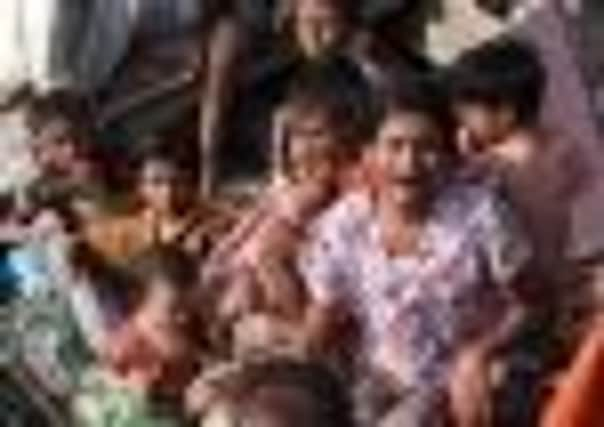Fresh killings in Burma amid ethnic strife


At least eight people were killed and many wounded, authorities said, in the worst communal violence since a reformist government replaced a junta last year and vowed to forge unity in one of Asia’s most ethnically diverse countries.
The fighting erupted on Friday in the Rakhine State town of Maungdaw, but quickly spread to the capital Sittwe and nearby villages. Reporters saw plumes of black smoke over Sittwe, a port town of mainly wooden houses where Buddhists and Muslims have long lived in uneasy proximity. Some Buddhists were seen carrying bamboo stakes, machetes, sling-shots and other makeshift weapons after Muslims were seen setting alight houses.
Advertisement
Hide AdAdvertisement
Hide Ad“We have now ordered troops to protect the airport and the Rakhine villages under attack in Sittwe,” Zaw Htay, director of the President’s Office, said. “Arrangements are under way to impose a curfew in some other towns.”


The unrest undermines the image of ethnic unity and stability that helped persuade the United States and Europe to suspend economic sanctions this year.
It might also force reformist President Thein Sein, a former general, to confront an issue that human rights groups have criticised for years: the plight of thousands of stateless Rohingya Muslims who live along Burma’s border with Bangladesh in abject conditions and are despised by many ethnic Rakhine, members of Burma’s predominantly Buddhist majority.
About 100 Rohingyas tried to flee the violence by boat into Bangladesh but were pushed back yesterday morning, said a Bangladesh border commander. “We have stepped up vigilance and will stop anyone trying to come across the border,” he said.
That followed about five boatloads carrying around 200 Rohingyas who were pushed back out to sea on Sunday, said Anwar Hossain, a major with Bangladesh’s border guard.
Rohingya activists have long demanded recognition in Burma as an indigenous ethnic group with full citizenship by birthright, claiming a centuries-old lineage in Rakhine. But the government regards them as illegal immigrants from Bangladesh and denies them citizenship.
Bangladesh has refused to grant Rohingyas refugee status since 1992. In recent days, they have been described as “invaders” or “terrorists” by some Burmese using their newfound freedom of expression and easier access to the internet to vent anger that has been simmering for decades.
The authorities have blamed Rohingya mobs for the violence. Witnesses from Maungdaw on Saturday described Rohingya attacking Buddhist homes. “It’s just like a living hell. I wonder how long we will have to live like this?” said Mya Khin, a housewife.
Advertisement
Hide AdAdvertisement
Hide AdThe western region has been tense for more than a week after the gang rape and murder of a Buddhist woman blamed on Muslims, and the reprisal killing by a Buddhist mob a week ago of ten Muslims. State media said three men had gone on trial on Friday for the rape and murder.